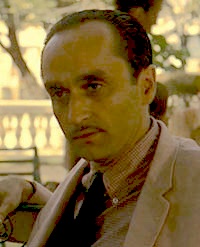This article describes a work or element of fiction in a primarily in-universe style.(March 2022) |
| Fredo Corleone | |
|---|---|
| The Godfather character | |
 John Cazale as Fredo Corleone | |
| First appearance | The Godfather |
| Last appearance | The Godfather Part II |
| Created by | Mario Puzo |
| Portrayed by | John Cazale |
| In-universe information | |
| Nickname | Fredo, Freddie |
| Title | Soldier, Capo, Underboss |
| Occupation | Mobster, Hotel & Casino Manager, Brothel Owner |
| Family | Corleone family |
| Spouse | Deanna Dunn-Corleone |
| Children | One son with Marguerite "Rita" Duvall |
| Father | Vito Corleone |
| Mother | Carmela Corleone |
| Brothers | Sonny Corleone Michael Corleone Tom Hagen (adopted brother) |
| Sister | Connie Corleone |
Frederico "Fredo" Corleone is a fictional character in Mario Puzo's 1969 novel The Godfather . Fredo is portrayed by American actor John Cazale in the Francis Ford Coppola 1972 film adaptation and in the 1974 sequel, The Godfather Part II .
Contents
- Appearances
- The Godfather
- The Godfather Part II
- The Godfather Part III
- Sequel novels
- Family
- In popular culture
- See also
- References
Fredo is the second son of the Mafia don Vito Corleone (Marlon Brando and Robert De Niro). Fredo is the younger brother of Sonny (James Caan) and the elder brother to Michael (Al Pacino) and sister, Connie (Talia Shire). Corleone family consigliere Tom Hagen (Robert Duvall) is his informally adopted brother. [1]
The character of Fredo is more indecisive than his brothers and lacks their determination. As a result, he has little power or status within the Corleone crime family. In the novel, Fredo's primary weakness is his womanizing, a habit he develops after moving to Las Vegas and which earns his father's disfavor. In the films, Fredo's feelings of personal inadequacy and his inability to act effectively on his own behalf are character flaws leading to his demise.